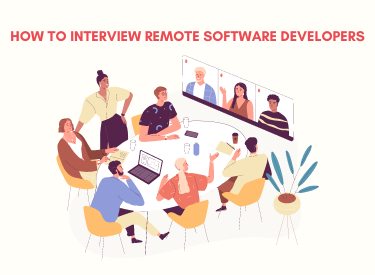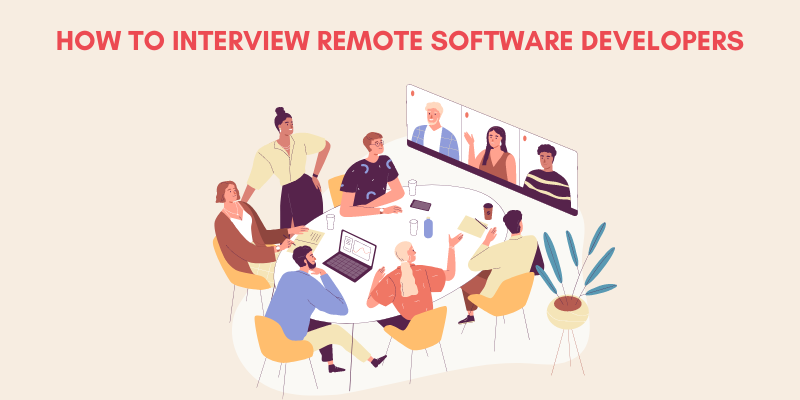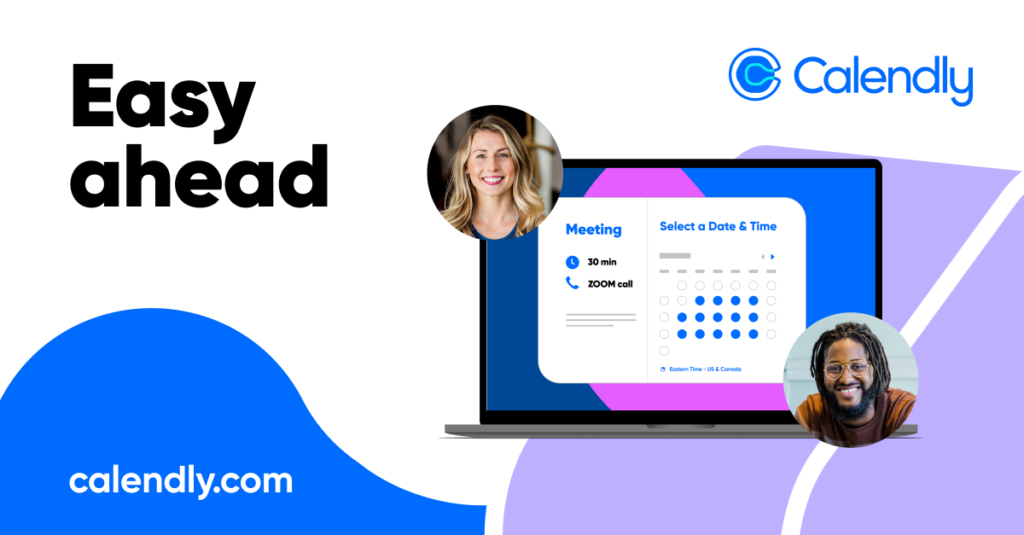How to Interview Remote Software Developers


A company’s most valuable asset is its employees. Hiring the right people determines whether your projects and company will succeed. However, finding the right candidates is not a simple task.
Interviewing is a skill in itself; remember that the candidate is also evaluating you. A software developer may lose interest if you appear unprepared or make a poor first impression. You won’t know if you have a qualified candidate unless you ask the right questions.
The interviewing landscape is changing; most software jobs are now remote and likely will remain so. Remote interviews present their own set of challenges. With candidates and interviewers dispersed across time zones, a streamlined scheduling process is critical. The days of asking a candidate to solve a technical problem on a whiteboard are long gone. To conduct a technical assessment of a software engineer from a distance, you will need the right tools.
Finding someone with only technical skills isn’t enough; they also need to collaborate and communicate effectively with a team. Therefore, you’ll need to assess their soft skills as well. A well-structured process and the right tools will provide a roadmap for successfully interviewing remote software developers.
Three Steps Before Beginning the Remote Interview
Before you begin the interview, ensure that you and your team are well-prepared, know what you are looking for, and have all the necessary tools to conduct the interview. This preparation will help you navigate the process smoothly and make a professional impression on candidates.
1. Make Sure You’re Ready
- Besides preparing your questions, review the job description, requirements, and responsibilities to ensure alignment with the candidate.
- Prepare your workspace ahead of time. Use pen and paper for note-taking to avoid distracting the candidate with keyboard noises.
- Prepare for potential issues by having a backup plan. For example:
- Internet Connection Issues: Bring a mobile hotspot in case of slow or unavailable internet.
- Laptop Battery: Ensure your laptop is fully charged and keep a power adapter handy.
- Camera and Microphone: Double-check these devices before the meeting to avoid malfunctions.
2. Choose Remote Interviewing Tools
As remote work becomes more prevalent, businesses must use the right tools and software to facilitate the remote interview process effectively. Consider the following options:
Interview Scheduling Software: Helps coordinate interview times across different time zones.
- Google Meet: Use Google Meet Events to schedule interviews, which include a link to the meeting. Google Calendar Events are frequently integrated with desktop and phone calendars, ensuring that everyone arrives on time.
- Calendly: This tool allows you to email up to six of your calendars to candidates so they can schedule interviews during your available time slots. Calendly also offers a free plan.
Applicant Evaluation Software: Helps prepare for interviews and identify quality candidates.
- VidCruiter: A candidate assessment tool that allows for automated testing of hard and soft skills. The software records one-way video interviews for your review, saving time and helping identify the best candidates. This also avoids scheduling conflicts with candidates who may be unavailable during regular business hours.
- Harver: Developed with the help of industrial and organizational psychologists, Harver supports various pre-employment assessments, including virtual interviews, cognitive, behavioral, and skill assessments. It uses scientifically validated assessments, predictive analytics, and workflow automation to help you quickly hire the right people.
3. Provide Information to the Team
Invite other team members to join the interview. Prospective software developers will appreciate meeting the people with whom they will be collaborating. Existing team members will value the opportunity to share their thoughts and opinions about each candidate, especially if they are software engineers.
Ensure that each team member knows who will lead the interview and when. Make sure everyone understands how to mute their microphone when not speaking to reduce background noise.
Ready to streamline your remote interviewing process? Equip your team with the right tools and strategies to find and hire top talent efficiently.
Read more: Recruit A Dedicated Development Team in Vietnam
Step-by-Step Instructions for Interviewing Software Developers
1. Schedule Your Remote Interviews
The fear of the unknown can be particularly daunting for developers. To alleviate this, provide candidates with clear information about what to expect.
Schedule all interviews in advance so candidates know the date, time, and duration of their interviews. Back-to-back appointments help maintain the schedule and ensure adherence to appointment times. Use scheduling tools like Calendly, which allow candidates to select a time slot that fits their availability.
These tools often include automated email and text reminders to ensure candidates remember their appointments. Virtual appointments can be easier to ignore than in-person ones, so reminders are crucial.
2. Send an Interview Summary
Send an email outlining the interview process to each candidate before the interview. This is especially important for remote interviews, as it may be the candidate’s first experience with a virtual interview.
Include the following details in the email:
- Date, time, time zone, and expected length of the interview
- Names and positions of those participating in the call
- Tools to be used, such as Google Meet, Zoom, or Microsoft Teams
- Instructions for configuring the tool—do not assume candidates can set up software without guidance
- How to join the remote interview session, including any required login credentials
- A reminder to run a test before the interview and allow time for troubleshooting
- Instructions for what to do if the call is canceled
- Tips for interview preparation, including examples of potential questions
Emphasize the importance of maintaining the same etiquette as an in-person interview. Ensure that candidates are on time and in a quiet, distraction-free environment.
Remote interviews require additional etiquette. To prevent speech overlap caused by latency, everyone should pause briefly after speaking and address the camera clearly. Providing occasional visual cues can help indicate ongoing presence.
3. Conduct Remote Interviews with Candidates
When interviewing candidates, whether in person or remotely, evaluate their technical skills and expertise alongside their personal and professional qualities.
Since you are hiring new employees, it is essential to ensure that the developers you hire have the right attitude for the project and can work well with your in-house team. You are the best judge of which personalities will fit well with your team.
4. Provide Helpful Feedback
According to LinkedIn, 94% of interviewees appreciate feedback after their interviews to help them improve. However, only 41% of those eligible have received it. Slow feedback is one of the most frustrating aspects of the hiring process for 50% of developers.
Therefore, provide candid and timely feedback to candidates who have made an effort to prepare and participate in the interview.
Remember to thank each candidate for their interest in your company. Even if they are not selected, they may be great candidates for future openings.
In fact, candidates who receive constructive feedback are four times more likely to return for future opportunities with your company.
The Most Commonly Asked Interview Questions
Many software developer interview questions focus on your technical skills, such as the programming languages you are familiar with. These aspects are usually covered during the screening process, and now the emphasis shifts to assessing your problem-solving and analytical abilities. This helps determine if a candidate will fit in with the company culture. Being a good software engineer who can write code is not enough. Here are some examples of interview questions for software engineers:
- Describe your most recent project, including any challenges and contributions.A specific project question helps you understand how you process information and handle adversity. It doesn’t matter if the project involved object-oriented programming or something else. Discuss the tasks assigned to you to gauge your level of responsibility. Start with the steps you took to achieve the goal and end with the project’s outcome.
- How do you determine the success of a project?While delivering high-quality software is crucial, software that fails to meet user and business needs adds little value. Examine the candidate’s ability to think outside the box and solve real-world problems. This often involves identifying metrics to improve and developing testable hypotheses about the project’s expected impact.
- Tell me about a failure in your professional career.This can be a challenging question if the candidate is unprepared. Make them feel comfortable admitting their flaws. Explain that this question aims to understand how they handle setbacks and solve problems. After describing the problem, they should include how they resolved it to demonstrate their problem-solving skills.
- What aspect of our company, product, or team piques your interest?In agile software development, retention is a top priority. Replacing a team member can be costly in terms of recruitment and training time. Look for specifics that reflect the company’s values, past projects, or job responsibilities that align with the career path you offer.
- In three years, where do you see yourself?This question focuses on the skills the candidate wishes to learn and improve. It helps determine if the candidate will be a long-term employee and if their goals align with the company’s objectives. Encourage honest responses to this question.
Conclusion
Conducting a thorough interview is a time-consuming process. To ask the right questions, you must first understand the candidate and the role. During the interview, pay close attention to the candidate’s responses, ask appropriate follow-up questions, and take detailed notes.
Finally, interviewing requires careful analysis and collaboration with your team to evaluate both the candidate and the interview process. While this may seem time-consuming, it is well worth the effort. A professional interview will leave a favorable impression and result in exceptional hires. Conversely, a poorly conducted interview may deter top candidates and lead to mediocre hires. The people you hire will ultimately determine the success of your company, so make wise choices.

